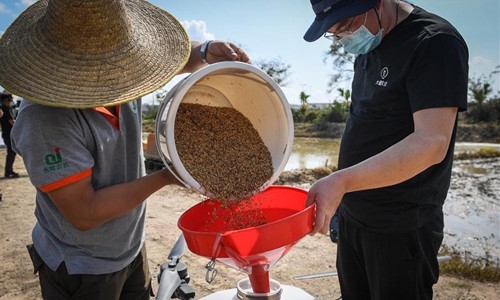HOME >> SOURCE
Food supply sufficient despite some import disruptions: experts
By Song Lin Source:Global Times Published: 2020/3/26 18:53:40

Staff put rice seeds into a drone in Shuikou Township of Kaiping, South China's Guangdong Province, Feb. 26, 2020. (Xinhua/Mao Siqian)
China's overall food supply is sufficient despite the COVID-19 pandemic and natural disasters that have caused some countries to suspend or reduce food exports out of concerns over domestic shortages, experts said.
Though China is a large agricultural products importer, "the country's grain market is self-sufficient, with wheat and rice reaching over 100 percent self-sufficiency rates," Jiao Shanwei, editor-in-chief of cngrain.com, a website specializing in grain news, told the Global Times on Thursday.
The pandemic has raised concerns in the global agriculture market, together with some countries' drought problems and locust infestations, Jiao said.
Vietnamese Prime Minister Nguyen Xuan Phuc has called for a temporary halt to new rice export contracts, VGPNews - the government's online news site - reported on Wednesday. The Southeast Asian country is the third-largest rice exporter in the world.
China's rice imports from Vietnam reflect its relatively low prices rather than rigid demand, and decreasing imports from Vietnam could help reduce China's rice inventory, which is currently in a periodic surplus situation, Li Guoxiang, a research fellow at the Chinese Academy of Social Sciences, told the Global Times on Thursday.
Official data showed that China produced 209.6 million tons of rice in 2019.
VGPNews said China imported 477,000 tons of rice from Vietnam in 2019, which equaled about 0.2 percent of China's own output.
The pandemic, though having caused restrictions in logistics systems, would not have much impact on China's food supply, both experts noted.
China reported record high grain production of 663.84 million tons in 2019, up 0.9 percent year-on-year, according to the National Bureau of Statistics.
As China has seen an easing epidemic situation, it has been ramping up efforts to resume production as well as the spring ploughing. The growth rate of nearly 90 percent of winter wheat in China's six major winter wheat producing areas is equal to or better than that of last year, which was generally better than previous years, the Xinhua News Agency reported on March 12.
"The overall supply of food in China is not a problem," Li said, but short-term price fluctuations are inevitable, and related government departments should enhance monitoring and adjustments to balance supply, such as guiding production expansion of certain products or releasing national reserves.
Meanwhile, as the spread of the virus is escalating overseas and supply chains of all sectors including agriculture have been highly diversified, it is not possible for a country to totally avoid the disaster by itself, and countries and regions should shore up cooperation in a bid to combat the disease, Li stressed, and ensuring basic logistics operation on the premise of epidemic prevention is conducive for all aspects, especially for exporters' local farmers.
Kazakhstan suspended exports of socially significant food products on March 22 to guarantee domestic supply, including buckwheat, wheat and rye flour, Xinhua reported. The ban is valid at least until April 15.
Posted in: INDUSTRIES,ECONOMY,BIZ FOCUS